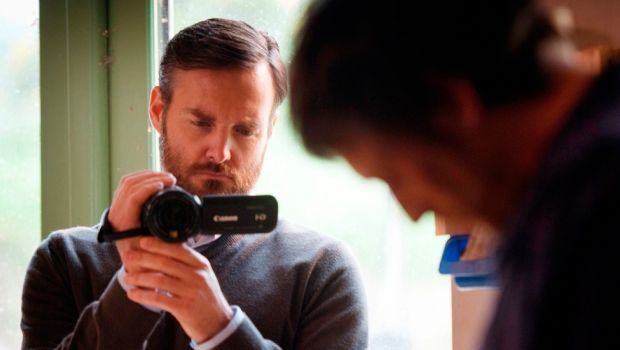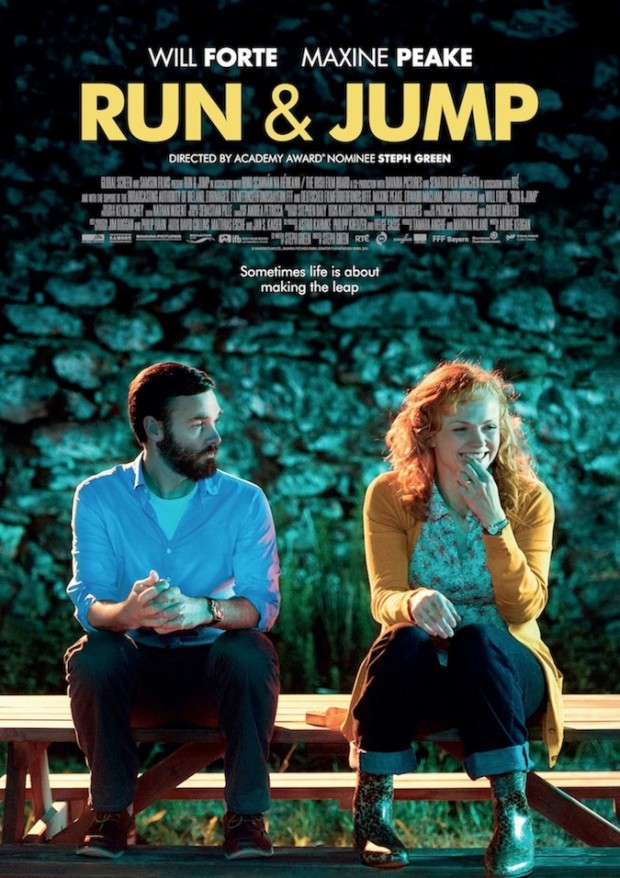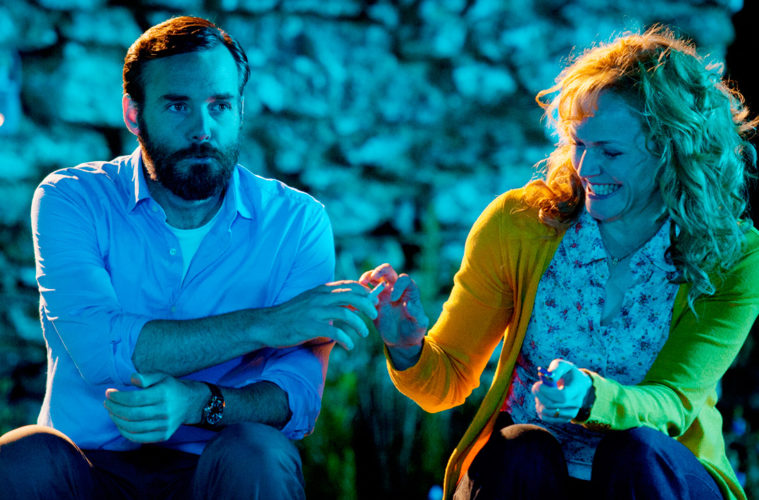
Run & Jump was one of the biggest surprises so far in a strong year of films at Tribeca Film Festival. An absorbing, tender look at a tested marriage, the film comes from first-time director Steph Green, who shot on location in Ireland. Starring Maxine Peake as Vanetia, a strong-willed women whose husband Conor (Edward MacLiam) is recovering from a stoke, she is under the observation of an American, Dr. Ted Fielding (Will Forte in a dramatic turn). We sat down with director and co-writer Green and the leads the evening following the film’s world premiere at the Tribeca Film Festival. Check out our conversation below.
The Film Stage: Thanks for sitting down with us. How’s the fest going so far?
Steph Green: I think I can speak for us all that we’re having a great time. We had the world premiere last night?
I know, hard to get a ticket for it. We had the IMAX experience, we were all the way up front.
SG: Oh I’m sorry – it’s not a good movie to see up very close.
Very intimate.
SG: A lot of handheld…
Yes. Can you tell us how the story came about?
SG: The original script was written by Ailbhe Keogan, an Irish writer whose father suffered a brain injury. So she had the real life version of this with her family coping with something like this, where there was a new version of her dad. It’s a real look at her mother, and how she coped with her husband coming home and of course there’s this added story that I brought in when we started co-writing, which was this foreign doctor, just to make the dynamics more complicated, and to play with this unconventional love triangle.
Yes, you have an interesting and mature way of handling, where the story doesn’t go where other filmmakers have before — it has a very interesting structure.
SG: I was just terrified of making a really clichéd movie, because it did contain a lot of those trap doors into sentimentality or soap opera, with people sitting around having cups of tea at a kitchen table with looks and glances of affection. Structurally we were trying to not do the expected.
So casting Will Forte, he’s a comic actor. How did you jump on board, Will?
SG: He ran and jumped.
Will Forte: My agent is an old friend of Steph’s.
SG: Your agent normally would like to use an actor from the same agency, so they have you look first at those lists, and you were the only person at UTA. I was very interested in Will from that point. I started researching everyone at UTA, and luckily I was friends with his agent so we had coffee.
WF: I think I met you the first time at your office. I had heard from my agent who said she was interested and my agent loved the script, so she sent it to me and I loved it as much as she did and I wanted to be a part of it. We went from there.
SG: People thought I was crazy, but now I feel incredibly validated with all the success Will is having. And his manager said to me, “everyone wants to say they are first, but really they want to be second. But you believed in him first.”
WF: I can’t thank you enough…OK – I’ll stop. It’s been an amazing learning experience, I learned so much from Steph, and Maxine and Ed. It’s all-new territory for me, and they made it such a comfortable and wonderful process. It was such a special time; the whole experience was beautiful and terrifying at times. It’s something I will never forget.

So what was so terrifying about the process?
Maxine Peake: Working with British actors.
WF: Trying to understand their accents. No, it’s hard to trust yourself and believe in yourself. There are so many ways Steph was a wonderful leader, and the confidence she had in me helped me be confident in myself. That was the most valuable thing, and the acting stuff she guided me through the process and told me when I was blowing it and also tell me when she thought I was doing a good job, so you just learn what she wants. It was a great and valuable experience.
I think what’s so wonderful is your character is an outsider and the way the film is framed and the space is composed in each shot, the film grows on you. The first few minutes I wasn’t quite sure where it was going, and then it dawned on me how brilliant the choices you’ve made, Steph, in terms of the role of the observer?
SG: I’m glad you said that about the beginning, I think people get into it much later, and I had feedback from executives that you have punch up the first 10 minutes, and all these notes. But what we found is you need to spend the first few minutes weirdly, to see these tiny slices of domestic life, even if it’s fast and you weren’t on sure footing and who to root for. I had only learned that through trial and error, without those introductory little moments, like Will in the bathtub and two second scene with Vanetia hovering. They are really short scenes, but if you had not spent that time, you’re just not with the movie at all. Then it just turned into a really predictable film.
Were you fighting the forces that are to not box it in to something like a rom-com?
SG: It would have just been so bad, and luckily my producers [Martina Niland and Tamara Anghie] were so supportive. They knew if we took a wrong turn it would have been so bad. There these pitfalls we avoid, you don’t ever judge the characters, and you feel like you can relate all of them.
Maxine and Edward, it’s so perfect how you’ve portrayed this women who’s caught up in this uncertain territory. Can you talk about how you created this very realistic character?
MP: We had five days of rehearsal, which is sort of long in British terms, but it was a lot of improvisation, we’re in a room in a studio. We improvised the first moment Vanetia and Conor meet, and writing out our bios. Then we’d sit with the family and say things like, “I remember the first time you, rode you’re bike without your stabilizers” so you can create these collective memories. There are these moments you tap into in the memory bank. That’s what I felt kind of difficult, a lot of the memories you create you start to feel sorry for the character and I had to battle against that. I had to stop feeling sorry for Vanetia because Vanetia didn’t sorry for herself, so I had to get over that hurtle and not sit through every scene and cry.
Edward Macliam: Part of the process we did with Steph, and subconsciously it got you to trust your instincts, whenever she switched the camera on, I felt there was such a solid structure put on us to just really try out what we wanted to. And we could always trust and be confidant Steph nudging us in the right direction.

This is your first feature film. What did you notice in transitioning from shorts?
SG: I think the most challenging part from me was trying to find financing, you’re almost there and then a bolder comes and knocks the whole project down. And you start from scratch again — you’re being told your project isn’t getting financed for this reason or no, it’s that reason. In the end you have to stay at it and hope it happens. And then once we were financed it felt like a huge gift was given to me and I had been given a privilege. It’s always a privilege to make a short but I had been granted permission to tell this long story with the actors I wanted. It’s been a dream of mine. It’s everything you hear all the time – it’s harder, a longer process — but this happens .These relationships have lasted for years, and that’s really fun. So the parts of it that are different I’m loving.
How long were you working on the film for, from screenplay to festival.
SG: Three years, that’s my quick canned answer, I’m sure it’s about right. The script was floating around before that but I wasn’t attached to it.
How did you become attached, it’s an Irish writer and you don’t have an Irish accent?
SG: I do not, I live there, and I have my Irish residency. I have been back and forth for the last 11 years, I went over 2001 to do a masters degree at University College Dublin and ended up staying, found some friends, found some possibilities. I had done some internships in LA, and knew that was there, and knew that was a direction I was going. But I think I felt accessibility in Ireland, just opportunities, not just career opportunities. Some part of me wanted to grow out and not just be the film major that moved to LA. So I started working on short films with friends, and the Irish Film Board took notice and once you have support from the Irish Film Board it’s incredible, and when I got that on my short film it made sense to go back to them and try to work together on a feature film.
Can you talk about the place you shot – it’s a beautiful film, a lot of use of natural lighting.
SG: We couldn’t afford lights [laughs]. No, we shot in Roundwood which is near Wicklow or in Wicklow. We matched the exteriors for landscapes, roads and locations in County Kerry. County Kerry is where Dingle, the small town you see in the film is, and the shop that you see — that’s all Dingle. So basically near Dublin and the west of Ireland.
Where’s the film going next?
SG: We just all want it to have a life and have it been seen. I want these performances to be seen. It’s a really tricky road for independent films and we’re going to hopefully be in more festivals and hopefully pick up distribution.
Great – I hope so too. Any last words before I leave you?
WF: It was an amazing experience, I feel like guys are my family now – Ed came out for pilot season and we lived together for two months.
And so did your character – he thought you he was part of the family.
WF: I hope Steph and Maxine get to live with me for a while too, or I get to live with them. You just get so close to people with this process, well close to good people. What a good group of people to go through this whole process.
SG: Sorry if we’re grossing you out.
No, I feel the same way – the film is structured a lot like that too.
SG: Thanks for coming.
Thank you.

Run & Jump is currently screening at Tribeca Film Festival 2013.

